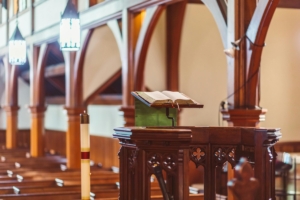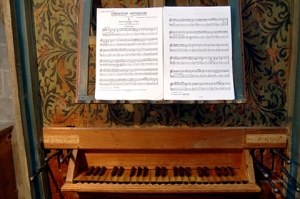The song “Dare to Be a Daniel” is yet another reason to adopt Mr. Murray’s view that, in public worship, we should sing only God’s Word (I reached the same conclusion in Recovering the Reformed Confession).1 Not only is the song itself . . . Continue reading →
Worship
The Reformation, The Regulative Principle, And The Modern Church: Examining John Calvin’s Dedication To Purity In Worship (Part 5)
The Reformed church today embraces John Calvin as one of our great spiritual predecessors and acknowledges his dedication to purity in the church, and so-called Calvinists champion his ideas on predestination and the sovereignty of God. Continue reading →
The Reformation, The Regulative Principle, And The Modern Church: Examining John Calvin’s Dedication To Purity In Worship (Part 4)
I tried to imagine what John Calvin’s reaction would be if he walked into your run-of-the-mill worship service today, complete with a full band and contemporary worship songs. The image was ruined by the fact that the only facial expression I can imagine on the great theologian is what I have seen in paintings of him. Continue reading →
The Reformation, The Regulative Principle, And The Modern Church: Examining John Calvin’s Dedication To Purity In Worship (Part 3)
During the summer before my freshman year of high school, I volunteered at my church’s Vacation Bible School program to lead games for the preschoolers. Something I noticed was that the students were more likely to listen to directions to do something than directions not to do something. I remember telling a girl to please refrain from putting her hands into the water bucket. And what do you think she did? She put her hands in the water bucket. Continue reading →
The Reformation, The Regulative Principle, And The Modern Church: Examining John Calvin’s Dedication To Purity In Worship (Part 2)
When I first read Calvin’s Institutes, the clarity with which he described the absolute transcendence and holiness of God struck me, especially as I considered how often my younger, more charismatic self was willing and eager to dismiss concerns about my preferences in worship, even if the concerns came from Scripture itself. Continue reading →
What You Consider Traditional Worship Is A Modern Innovation
To be fair, congregational singing has been under assault for a century or more. The “contemporary” worship of 100 years ago in some P&R churches already suffered from invasive species propagated by Oxford Movement’s high-church, Anglo-Catholic tendencies. Low churches got high. Organs . . . Continue reading →
The Reformation, The Regulative Principle, And The Modern Church: Examining Calvin’s Dedication To Purity In Worship (Part 1)
Walk into any corporate worship service today and you will almost certainly observe that the congregational singing is accompanied by instruments. There is no doubt that the common worship style of today, filled with various instruments and too often supplemented by stage lights and smoke machines, differs significantly from the worship one would have observed in a seventeenth-century Reformed church. Continue reading →
Owen On Worship
In general, it is certain that God intended to declare hereby that the work which Moses had to do, —the tabernacle he was to erect, and the worship thereof, —was not, either in the whole, or in any part of it, or . . . Continue reading →
God’s Love Is Not Reckless
Wafting over the airwaves of the local Christian radio station came the predictable chord progressions of every modern worship song known to humanity. I had turned on the radio to quell the boys’ incessant bickering currently testing my patience, and after a . . . Continue reading →
Review: A History of Contemporary Praise and Worship: Understanding the Ideas that Reshaped the Protestant Church By Lester Ruth and Lim Swee Hong
Whenever someone introduces himself to me as a worship pastor, my standard response is, “Me too.” Inevitably, my reply prompts inquiry about how I lead worship. So, I explain that I call the church to worship, I pray a lot, I read . . . Continue reading →
Does “Sing To Him A New Song” Justify Praise Songs?
We must read the injunctions to “sing a new song” in light of what the New Testament teaches us about types, (fore)shadows, and copies. Continue reading →
How To Give Up Instruments
As difficult as it was to reform the Dutch churches, rarely have Reformed people been in our situation: free churches (i.e., not state churches) that must persuade a free people to reform worship by giving up the only way of worship most have ever known. Continue reading →
If Instruments, Why Not Swords? (Part 3)
The question before us is how to regard the swords and the herem (חרמ) holy war implied in Psalm 149:6–9 alongside the tambourines, lyres, and dancing of Psalm 149:3. Continue reading →
Presbyterian Congregation Spends $1.8M On Organ
I understand that people love music. I understand that Christians are moved by instrumental music in worship. The question remains, however, does the Lord love instrumental music in new covenant worship? The question is: On what basis do we do what we . . . Continue reading →
If Instruments, Why Not Swords? (Part 2)
The question before us is how to regard the swords and the herem (חרמ) holy war implied in Psalm 149:6–9 alongside the tambourines, lyres, and dancing of Psalm 149:3. Continue reading →
If Instruments, Why Not Swords? (Part 1)
Let them praise his name with dancing, making melody to him with tambourine and lyre! For Yahweh takes pleasure in his people; he adorns the humble with salvation. Let the godly exult in glory; let them sing for joy on their beds. . . . Continue reading →
Rejoice! The Lord Has Come
And in the same region there were shepherds out in the field, keeping watch over their flock by night. 9 And an angel of the Lord appeared to them, and the glory of the Lord shone around them, and they were filled . . . Continue reading →
The Recovery Of The Call To Worship
Over the past several years, I have taught seminary courses on theology and practice of worship in the Reformed tradition. The syllabus requires students to interact with worship services posted online, evaluating the elements, coherence, and execution of the liturgy. The services . . . Continue reading →
John Owen And The Organ (Among Other Things)
In worship, their paintings, crossings, crucifixes, bowings, cringings, altars, tapers, wafers, organs, anthems, litany, rails, images, copes, vestments,—what were they but Roman varnish, an Italian dress for our devotion, to draw on conformity with that enemy of the Lord Jesus? In doctrine, . . . Continue reading →
What Is It?
A recent visit to what I suppose to be an ordinary, middle-of-the-road, mid-sized Southern Baptist church stunned me, though it shouldn’t have—I should have known better. What I encountered (they used the word “encounter” a lot) was arguably not a Christian worship service. . . . Continue reading →






